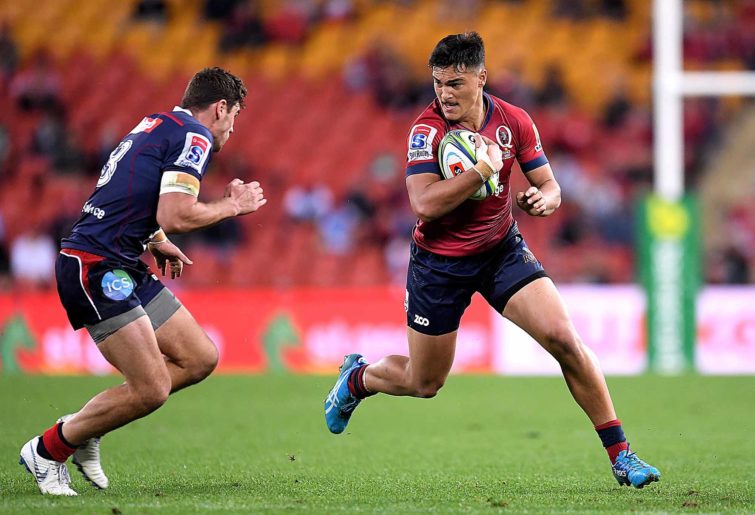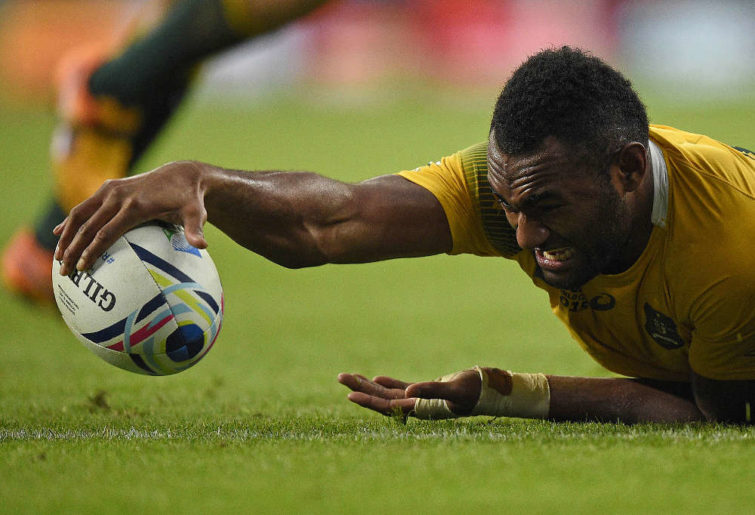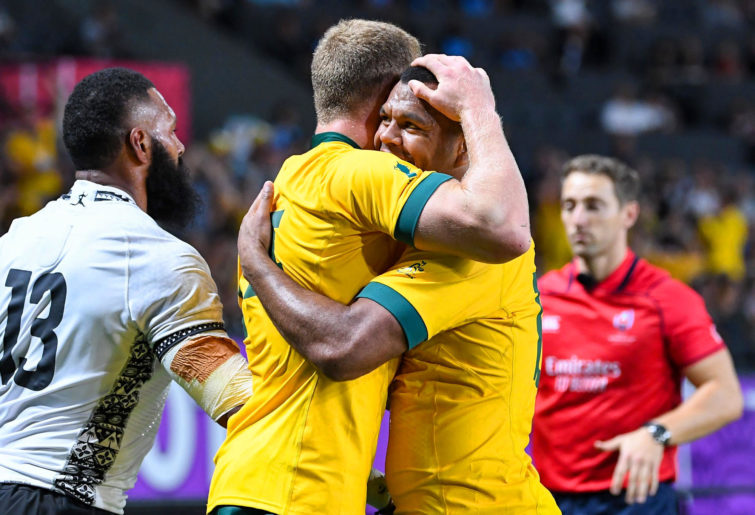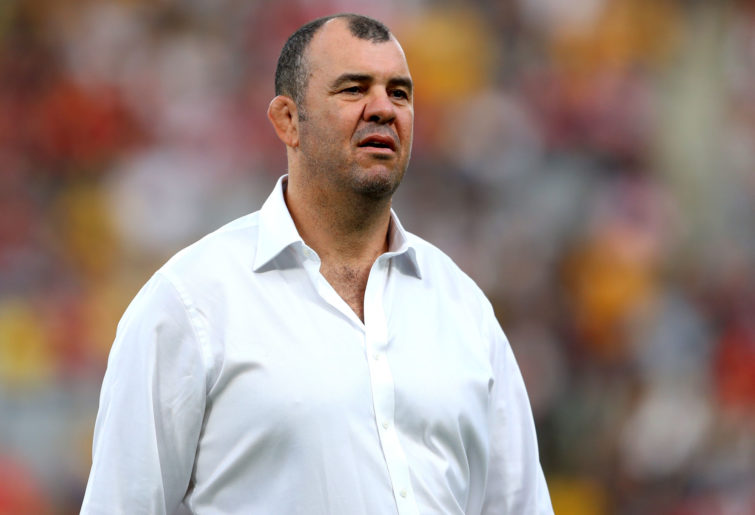The pundits called Jordan Petaia the ‘new Joe Roff’ even before the youngster had even played a Test match.
But now, after a sensational debut when he scored a try and set up another in the space of 15 minutes, Petaia must be regarded as his own man with his own identity as a gifted rugby player, and not a clone of a former Wallaby great.
What I look to see with all great and potentially great players is time, poise and balance.
The great Roman poet Virgil had an aphorism that was used for years by MGM films: “Ars Celare Artem (True art is to hide art).”
The best players make events that happen on the field, even the most difficult of plays, look easy. This is the point of Virgil’s aphorism.
They make the plays look easy, not because these plays are. But because they have mastered the skills of footwork, balance, speed, power and vision to such an extent they intuitively make the right moves.
You are born with these gifts. This is why the most gifted rugby players reveal their uncanny abilities at a young age for a contact sport like rugby.
When Jordan Petaia made his World Cup debut against Uruguay he was 19 years and 205 days old.
Remember that if he had debuted last year, as he was supposed to have done, he would have been the youngest Wallaby ever.
The youngest was Ben Tune who was 19 years and 177 days old when he first ran on to the field in a Wallabies jersey in 1996.
Joe Roff was 19 years and 253 days old when he first played for the Wallabies in the 1995 World Cup tournament in South Africa.
And David Campese, the greatest of all of them, was 19 years and 297 days old when he first tormented the All Blacks in New Zealand, and virtually forced his opposition winger Stu Wilson, a great winger in his own right, out of Test rugby.
The point here is that gifted players are born with physical and mental strengths that elevate them about their fellow players.
But being born with the gifts is no guarantee of greatness. The great players put in hours and hours of hard work, on and off the field, to turn their gifts into the hard reality of dominating their opponents.

Jordan Petaia with the Reds. (AAP Image/Albert Perez)
And they have a particular character in that they welcome the challenge to be great.
What was particularly pleasing about Petaia’s play was that he remained calm and ready out wide on the wing channels when for 20 minutes none of the play ran his way.
He keep his width and his nerve knowing that he was only going to get 40 minutes on the field.
This, as far as I am concerned, showed a sense of maturity that you need from players to become leading lights in a team that plays ensemble rugby.
As Bob Dwyer used to say, a great side sweeping onto attack, with all the players playing their part, is like a great orchestra reaching a crashing crescendo.
One of the faults of the Wallabies against Uruguay was that too often the senior players tried to make a play themselves rather than promoting the ball or setting up a ruck to keep the flow of the movement going forward.
Too often, the players were guilty of playing for themselves rather than for the team. Or perhaps more accurately, the players thinking that they had to make the big play when the occasion called for them to be a part of a big play.
After 23 minutes of play the ball finally came Petaia’s way.
Kurtley Beale, floated a pass out to Petaia. A couple of neat, incisive steps and Petaia had moved inside two defenders. He took the tackle and set up a ruck placing the ball for an easy delivery to the halfback.
The Wallabies moved the forward in a series of phase-ball attacks.
Beale then inserted himself into the play by calling for the ball as a first receiver.
An inside pass to Petaia from Beale saw the youngster step inside a couple of defenders, he broke two tackles with a burst of sharp speed and quick feet, to score his first of many (hopefully) Test tries.
A few minutes later, with another incisive break, Petaia passed to Tevita Kuridrani for the burly centre to cross over near the posts.

Tevita Kuridrani (Photo: AFP)
The point here is that two of the three tries the slow-starting (again) Wallabies scored against Uruguay in the first half had a significant input from Petaia.
And both of these interventions by Petaia were perfectly played, not over-played or under-played.
This showed me that here we have a player, rather like Tim Horan, who seems to make the right play virtually every time he gets the ball.
I make this point because the Wallabies have struggled to be as dominant on the scoreboard as they should have been throughout this tournament. Part of the problem has been that the players have over-played or under-played their hand and ended up compromising promising movements.
An indication of this is that the Wallabies are ahead on points differential of only two of the big five teams, with +49 points.
Wales with only two games played are +33 points. Ireland after three games +46 points.
New Zealand after three games are +100 points. South Africa after three games +90. England +99.
The Wallabies, in other words, do not have the fire power, especially out wide, to back up the terrific work done by their tight five, a five that is about as strong as any in the tournament.
The Springboks, England and the All Blacks have fliers out wide, back threes with fast, clever runners who finish off breaks made by the bigger runners on the inside and by their own partners in the back field.
The Wallabies do not have or have not fielded a back three with all these qualities of speed, evasiveness, skills and strength to break tackles or to run around tacklers to finish off tired defences.
Step forward Jordan Petaia to complete and complement with his rugby nous, skills, strength and pace the attacking trio of Kurtley Beale, Marika Koroibete.

Kurtley Beale celebrates a try. (William West/AFP/Getty Images)
I am calling for Michael Cheika to unleash this trio and give them a licence to skill in the next game against Georgia in preparation for a genuine finals onslaught.
Cheika should make a call about Petaia that his fellow Randwick player and coach and later Wallaby coach, Bob Dwyer, did by unleashing the young David Campese against the All Blacks.
In making this plea I give credit to Cheika for nurturing Petaia through his injuries, this season and last season, and keeping him in the squad this year and last year in the expectation that the youngster could be a crucial X-factor player in the Wallabies finals campaign.
The rugby pundits have been suggesting that ‘the next Wallabies coach’ will benefit from Petaia’s great talent.
But right now when the Wallabies need Petaia. Use his talent now to re-boot the Wallabies attack.
And make sure that in the final pool round match that the team that plays in the quarter-finals is the team that plays against Georgia.
Cheika needs his finals team to have at least one run together before the finals.
That team should be:
1. Scott Sio
2. Tolu Latu
3. Allan Alaalatoa
4. Izack Rodda
5. Rory Arnold
6. Jack Dempsey
7. Michael Hooper
8. Isi Naisarani
9. Nic White
10.Christian Lealiifano
11.Jordan Petaia
12.Samu Kerevi
13.Tevita Kuridrani
14.Marika Koroibete
15.Kurtley Beale
This side, in my view, virtually picks itself.
In the forwards, it is clear, that the Michael Hooper–David Pocock combination does not work at the start of a Test match. Its value is at the end, in the last 20 minutes or so, when Pocock can use all his energies to getting turnovers.
The White/Lealiifano combination is the best the Wallabies have, which is not saying much. Lealiifano, too, seems to be the best of the goal-kickers, which makes him essential as a starter rather than a finisher.
There is one other important point that needs to be raised as the Wallabies prepare for the finals.
Coach Cheika has to start prepping on the opposition.

Michael Cheika (Photo by Warren Little – World Rugby/World Rugby via Getty Images)
Before the match against Uruguay Cheika was asked whether he had prepared for the small, fast Uruguayan loose forwards who had foreshadowed that they were looking for turnovers as an important part of their defence.
Cheika’s reply to the question was totally unsatisfactory for a coach of the Wallabies: “I don’t know about that but Uruguay is a side with a big heart. They took it to us in the first 20 minutes of the last time we played them.”
And what happened. Early on Uruguay forced several turnovers that frustrated the Wallabies.
This seeming unwillingness to work out the opposition’s game plan led directly to Wales starting off their crucial match against the Wallabies by forcing a turnover from the use of a small forward as a catcher.
And then there is the continuing saga of Wallabies going in high with their tackles. Adam Coleman and Lukhan Salakaia-Loto were both sin-binned for high tackles early on in the game.
The only way the Wallabies could have lost to the Uruguay, a team that has never beaten a tier one country in over 40 Tests, would be if they were reduced to 13 players, a possibility given the small difference right now between yellow and red cards.
This disinclination by Cheika to do his homework on opposition could be part of the explanation why the Wallabies have started poorly in their two big must-win matches.
Against Fiji, the Wallabies were behind with about 20 minutes to go, 21–12. With their superior fitness, they were able to blitz the Fijians by scoring 18 points to win 30–21.
Again Wales, Wallabies were down 26–8 to Wales not long into the second half. Then they scored 17 points to 3 by Wales to lose 25–29.
The Wallabies won’t get far in the finals if because of poor preparation they are well behind at half-time.
So Cheika, unlike his new star Jordan Petaia, has to lift his game as a coach for the Wallabies to go deep into the finals.
































































































